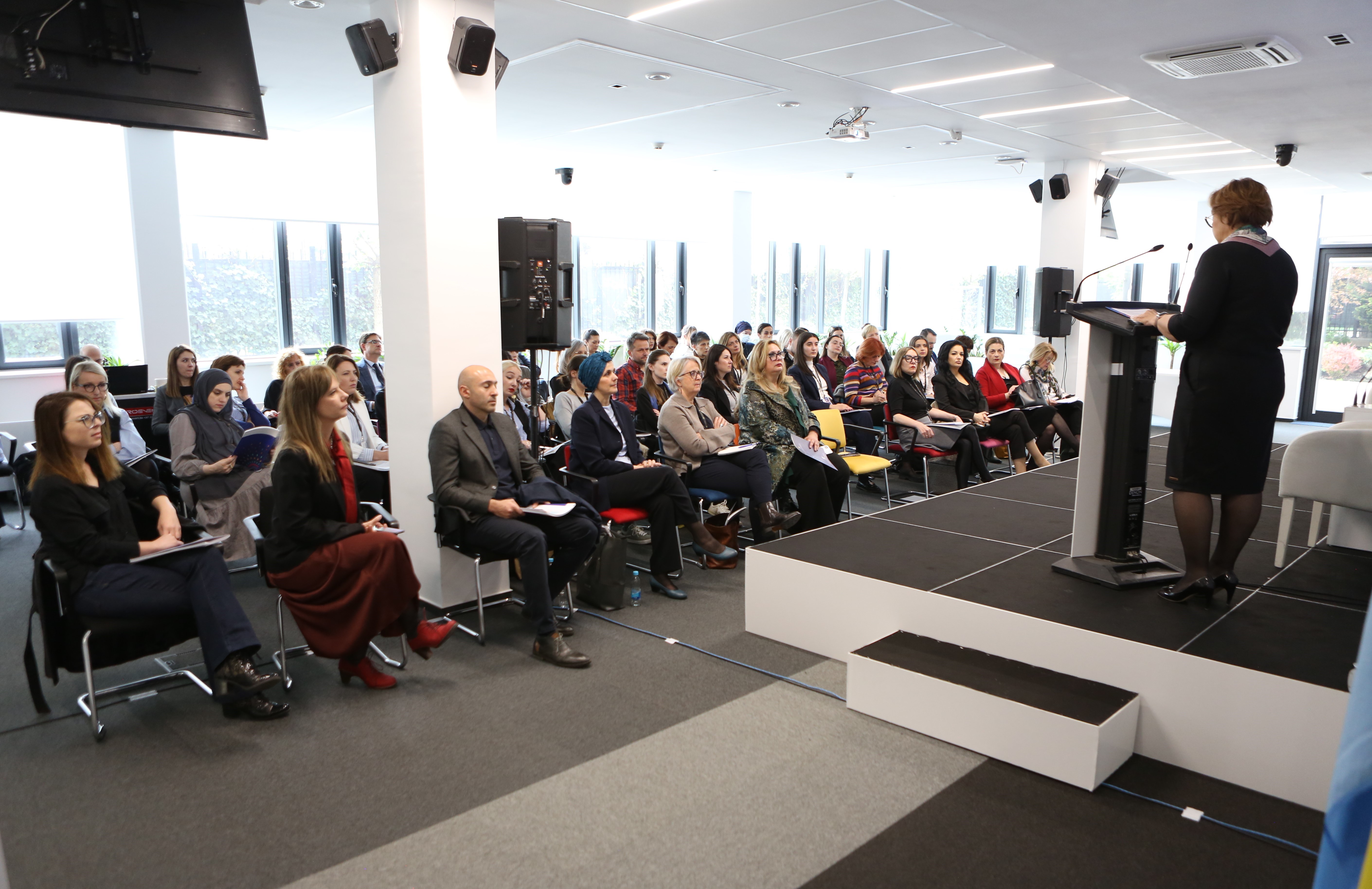UNDP BiH and Agency for gender equality of Bosnia and Herzegovina launched the Gender Equality Barometer
April 22, 2024

23 April 2024, Sarajevo – Today, the United Nations Development Programme and the Agency for Gender Equality of Bosnia and Herzegovina within the Ministry of Human Rights and Refugees of Bosnia and Herzegovina launched the Gender Equality Barometer, a comprehensive research project that explores daily household practises and division of labour, power dynamics and the intricate fabric of social perceptions, and sheds light on the prevailing stereotypes and norms that shape and influence the lives of women and men in Bosnia and Herzegovina.
“The Gender Equality Barometer represents the latest assessment of the status of gender equality in Bosnia and Herzegovina. The previous Gender barometer was implemented more than 20 years ago, so we have the possibility to compare the situation in certain segments. All surveys and researches of this kind are extremely useful for defining adequate policies and measures that could result in a systemic change in achieving gender equality in Bosnia and Herzegovina. In the previous two decades, significant steps have been taken to introduce sustainable institutional and legal framework for gender equality, as well as to strengthen capacities and raise awareness of professionals and the general public. But there is still a gap between the declarative approach and real indicators of equal opportunities for women and men in the BiH context. The complex political and economic situation, the increased influence of retrograde attitudes, gender based discrimination of the most vulnerable categories of the population, the increased number of reported cases of violence and femicide, the impact of the COVID-19 pandemic on health, physical and economic conditions, the low representation of women in decision-making positions, show that a lot of work still needs to be done to realize the principles of gender equality in practice and to implement gender-responsible policies.”.Agency for Gender Equality of Bosnia and Herzegovina
The barometer serves as a valuable tool for this purpose, providing a nuanced analysis of the challenges and opportunities that shape the experiences of women and men in different areas of life.
The research findings presented in this report are the result of analysing data collected through a survey of a representative sample of 1,800 women and men in Bosnia and Herzegovina, as well as 10 focus group discussions with women leaders and women members of vulnerable groups across Bosnia and Herzegovina.
This report goes beyond mere statistics. It looks at the reality of women's lives in Bosnia and Herzegovina and provides a platform for the voices that are often marginalised or unheard. By analysing key indicators, it is evident that achievement of greater level of gender equality requires work on education, economic empowerment of women, availability of social services, networking, mentoring support and building solidarity among women, as well as countering violence against women, which are reflected in the forms of hegemony and toxic masculinity, misogyny and sexism.
“Data in this report tells a story of how social conditioning shapes opportunities, choices, and wellbeing of women and men. By unraveling the origins of stereotypes, auto-stereotypes, and internalized misogyny, and by deconstructing them- we can understand how to challenge and change the social norms that block the progress. This step is essential for working even more effectively with the Agency, our partners using Women Forum for Development and other channels to address systemic inequalities and unlock new pathways to collaboration, structural changes and empowerment.”Narine Sahakyan, Resident Representative a.i. of UNDP Bosnia and Herzegovina
Key findings from the study include:
1. Positive Perception of Progress: An overwhelming 90% of respondents believe that the situation of women has improved since the implementation of institutional and legal frameworks for gender equality.
2. Influence of Traditional Social Norms: Despite progress, traditional social norms continue to heavily influence women's career decisions. Women face scrutiny and societal pressure if they display dominant or entrepreneurial traits. Moreover, women in politics are subjected to double standards, with the public often being more critical of women politicians.
3. Perceptions on Leadership Roles: Approximately one-third of respondents believe that men are better suited for managing large companies. Conversely, nearly 80% of respondents believe that women are better in running small businesses due to time and flexibility it offers for family time.
4. Gendered Division of Domestic Labor: The study highlights the persistent gendered division of domestic labor, with women shouldering the majority of unpaid work such as cooking, childcare, ironing, and caring for sick family members. This unequal burden limits women's career options and diminishes their agency in political and public life.
5. Impact of Care-Economy Offerings: Women in BiH spend 6- 7 hours daily on unpaid work. In over half of households, women are solely responsible for cooking, and nearly a quarter believe childcare is exclusively a woman's duty. Additionally, two-thirds consider ironing as women's work, while only a third share the responsibility of caring for sick family members. Only 1% of households in BiH outsource care and household chores, a practice uncommon even among higher income earners. Therefore, the study concludes that availability and quality of care-economy offerings significantly influence women's career choices. Underdeveloped, inefficient, and unaffordable social services constrain women's options, leading many to pursue fields that allow for greater flexibility and balance with family responsibilities.
This study also aims to pave the way for positive change by utilising the platform provided by the Women's Forum for Development, a joint venture of UNDP and the Gender Equality Agency of the Ministry of Human Rights and Refugees of Bosnia and Herzegovina, to strengthen women’s leadership and participation in economic, public and political life.
The findings of the study will be followed by an extensive dialogue between different profiles of professionals, transformative leaders and practitioners contributing to the Women Forum for Development on ways to further explore the findings for meaningful social change.
The report can be downloaded here.

 Locations
Locations





